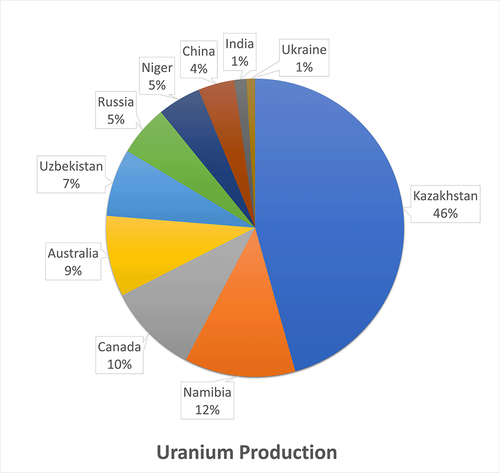SOURCE:
In his first overseas trip since the start of the coronavirus pandemic, Chinese President Xi Jinping will visit the country responsible for roughly half of the world's uranium production.
On September 14, Xi will visit Kazakhstan, the SCMP reported citing a Monday announcement at a briefing by the Kazakh foreign ministry. It follows months of speculation about the location of Xi’s first trip abroad since he went to Myanmar in January 2020. Beijing’s strict zero-Covid policy has curtailed travel inside and out of the country, and Xi and other senior figures have not left China since the start of the pandemic.
Of the 25 Politburo members, only foreign policy chief Yang Jiechi has travelled abroad. Meanwhile, the country’s No 3 official, Li Zhanshu, will go to Russia on Wednesday in a sign that China’s top officials are resuming international travel. Li, head of the legislature, will also visit Mongolia, Nepal and South Korea.
As reported previously, Indonesian President Joko Widodo has said Xi will visit Bali for the Group of 20 summit in November - where Vladimir Putin and Zelenskyy will also be present.
Xi will meet Kazakh President Kassym-Jomart Tokayev for talks the host government said were “aimed at further deepening the eternal comprehensive strategic partnership and developing political, trade, economic, cultural and humanitarian cooperation”.
The visit could be followed by a trip to Uzbekistan to attend the Shanghai Cooperation Organisation summit, according to the SCO’s official Telegram channel. In a post on Sunday, the SCO said that “the leaders of all states confirmed their full-time participation in the summit” in Samarkand, to be held on September 15 and 16.
More importantly, in Uzbekistan, Xi would be expected to meet Russian leader Vladimir Putin for the first time since the pair announced a “no limits” partnership on the eve of the Beijing Winter Olympics. Just three weeks later, Russian forces invaded Ukraine, leading to much speculation about how much Xi and other Chinese leaders knew about the operation in advance.
The pair have been in telephone contact since – notably on Xi’s 69th birthday on June 15. At the time, Chinese state media quoted Xi as saying that “China is willing to continue to support the Russian side on issues related to core interests and major concerns such as sovereignty and security, to work closely on strategic cooperation between the two countries”.
Russia is one of eight member states of the SCO, along with China, India, Kazakhstan, Kyrgyzstan, Pakistan, Tajikistan and Uzbekistan. There are four observer states in the process of acceding to the forum – Afghanistan, Belarus, Iran and Mongolia – while Armenia, Azerbaijan, Cambodia, Nepal, Sri Lanka and Türkiye are dialogue partners.
Temur Umarov, an expert on China and Central Asia at the Carnegie Endowment for International Peace, said that choosing the region as a first overseas trip emphasized Beijing’s ambitions to expand its influence there. Indeed, it is hardly a coincidence that China is heading to the one country responsible for nearly half of the world's uranium production.
A violent crackdown on civil unrest in Kazakhstan in January caught Beijing by surprise, Umarov said, with Russian troops being sent in to quell the protests. In total, there were more than 200 deaths, Human Rights Watch has said.
“We should remember that at that time, China looked so weak in Central Asia and Russia was very active,” Umarov said. “It was a pivotal moment that made China realise that something should be done to expand their understanding of Central Asia, to extend China’s ability to forecast what was going on and what will be happening in Central Asia.”
Separately, in July, after 20 years of negotiations, Beijing agreed with Bishkek and Tashkent to begin building the China-Kyrgyzstan-Uzbekistan railway next year. It will give China another railway route into Central Asia in addition to existing links with Kazakhstan, and Russia’s invasion of Ukraine appears to have given the project some impetus.
Previous media reports had speculated that Xi’s first overseas visit would be to Saudi Arabia. Meanwhile, the South China Morning Post reported in July that China had asked the leaders of some Western European countries to visit Beijing in November, taken by some as an indication that Xi would be confirmed for a third term as Communist Party chief at the national congress in October.
